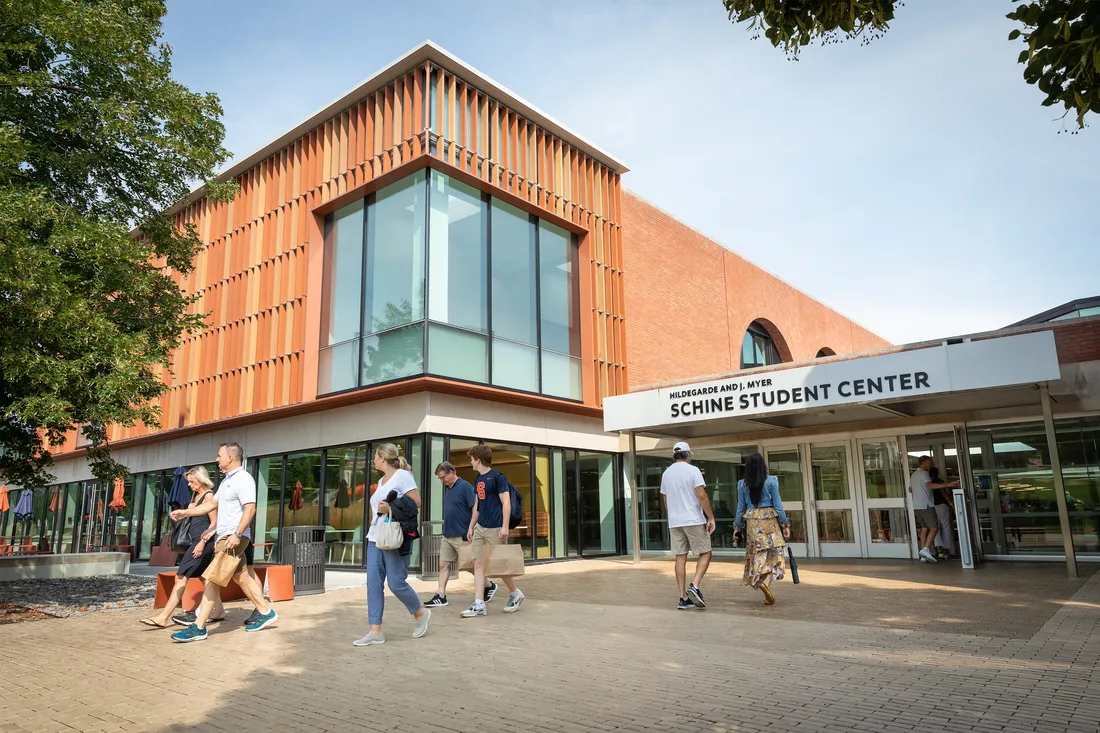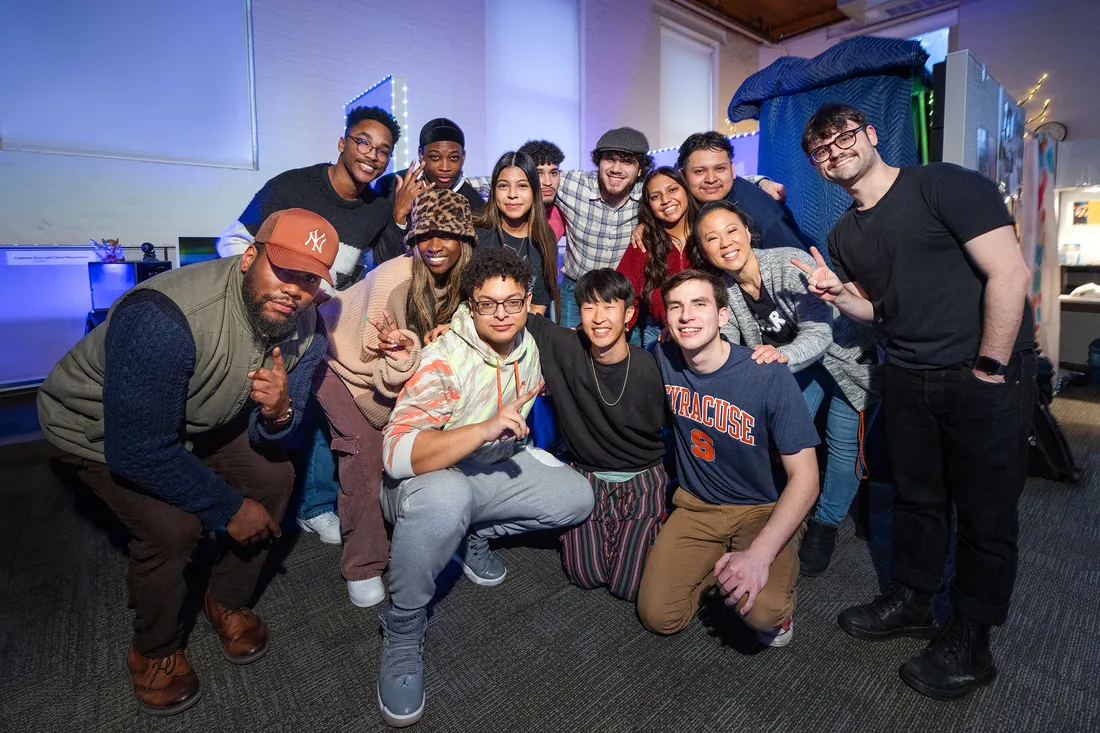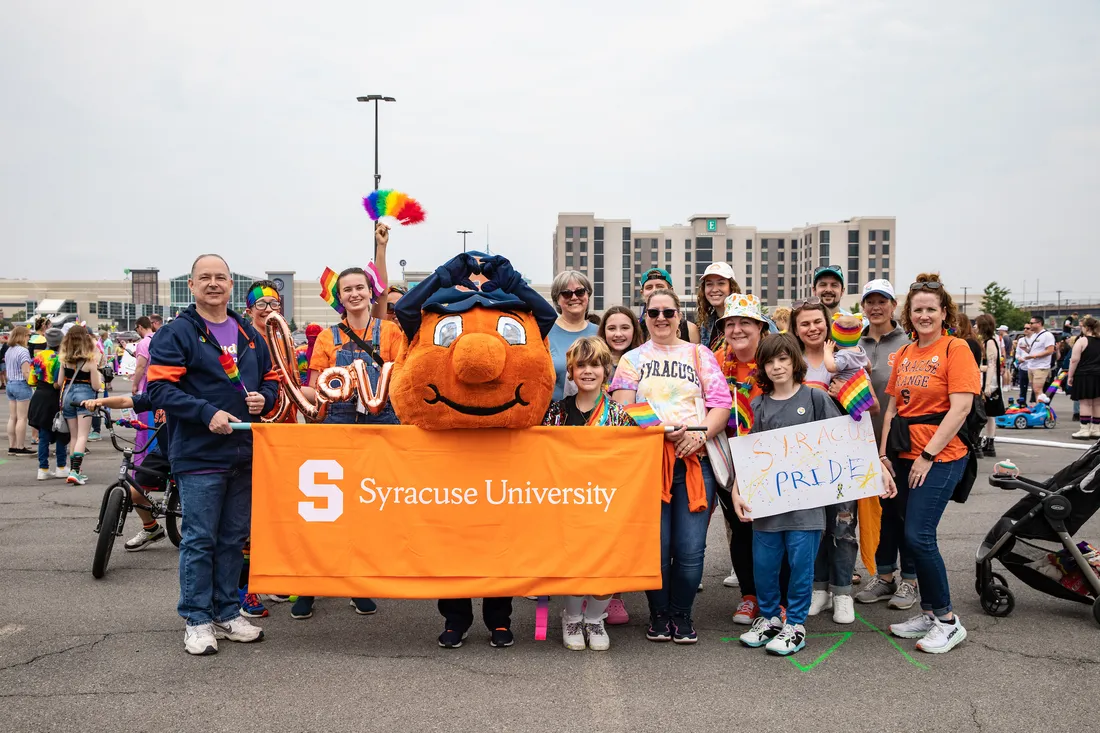
Members of Syracuse University at the CNY Pride Parade and Festival, which has been an annual tradition since 1985.
When Tommy DaSilva ’26 arrived at Syracuse University two years ago, he wasn’t sure if he'd fit in. “It took me a while to find my community,” says the affable legacy student, who self-identifies as a queer, nonbinary person of color.
DaSilva sought out the LGBTQ Living Learning Community (LLC) on the fourth floor of DellPlain Hall and the LGBTQ Resource Center in nearby Schine Student Center, where he has worked part time. The center is part of the Intercultural Collective (IC), an umbrella organization in the Division of the Student Experience that fosters inclusion and belonging on campus.
“The LGBTQ Resource Center is great because it works with the IC to provide resources, trainings and programs to students,” says DaSilva, a triple major in public health, policy studies, and citizenship and civic engagement (CCE). “I feel like I’m not alone in my experiences as a student—that there are people I can turn to for support.”
They include Joshua Seguí-Rodríguez (JSR), executive director of intercultural engagement, and Nathan Torabi (NT) ’26, a fellow CCE major also pursuing degrees in political science and law, society and policy.
We recently caught up with them and DaSilva (TDS) to discuss the University’s involvement with Pride Month and its broader commitment to inclusive excellence.
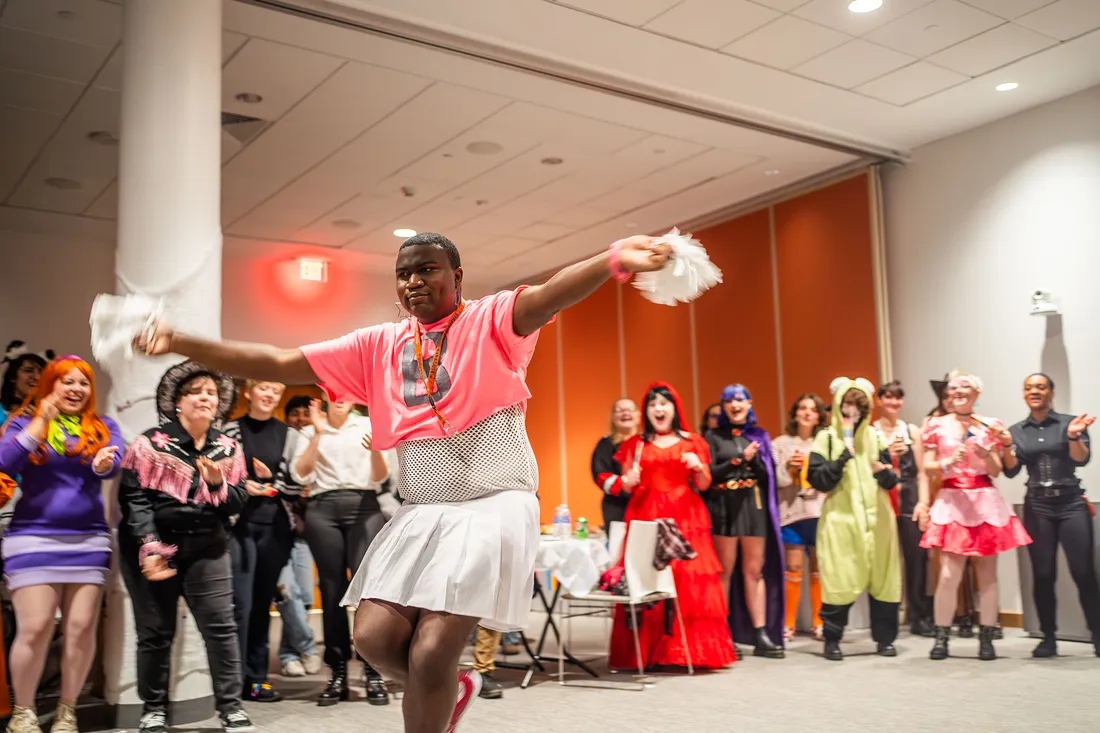
Tommy DaSilva ’26 at the HalloQueen Ball, a highlight of the University’s LGBTQ History Month celebrations in October.
June marks the 55th anniversary of the Stonewall Uprising, a series of events between New York City police and LGBTQ protestors that helped ignite the gay rights movement and Pride Month. What can we learn from these milestones?
JSR: The protestors at Stonewall stood up for their rights to be acknowledged and respected. Their courage and determination sparked a movement that has led to significant advancements in LGBTQ rights. We must learn the importance of actively listening to and addressing the concerns of marginalized communities to foster a more inclusive and equitable society.
I oversee the Intercultural Collective, which builds on the legacy of the Stonewall events by giving space to people from all walks of life, including historically excluded communities. We don’t limit LGBTQ historical education to a single day or month. The IC considers it a year-round celebration. It feels good to come together and be surrounded by people invested in our success.
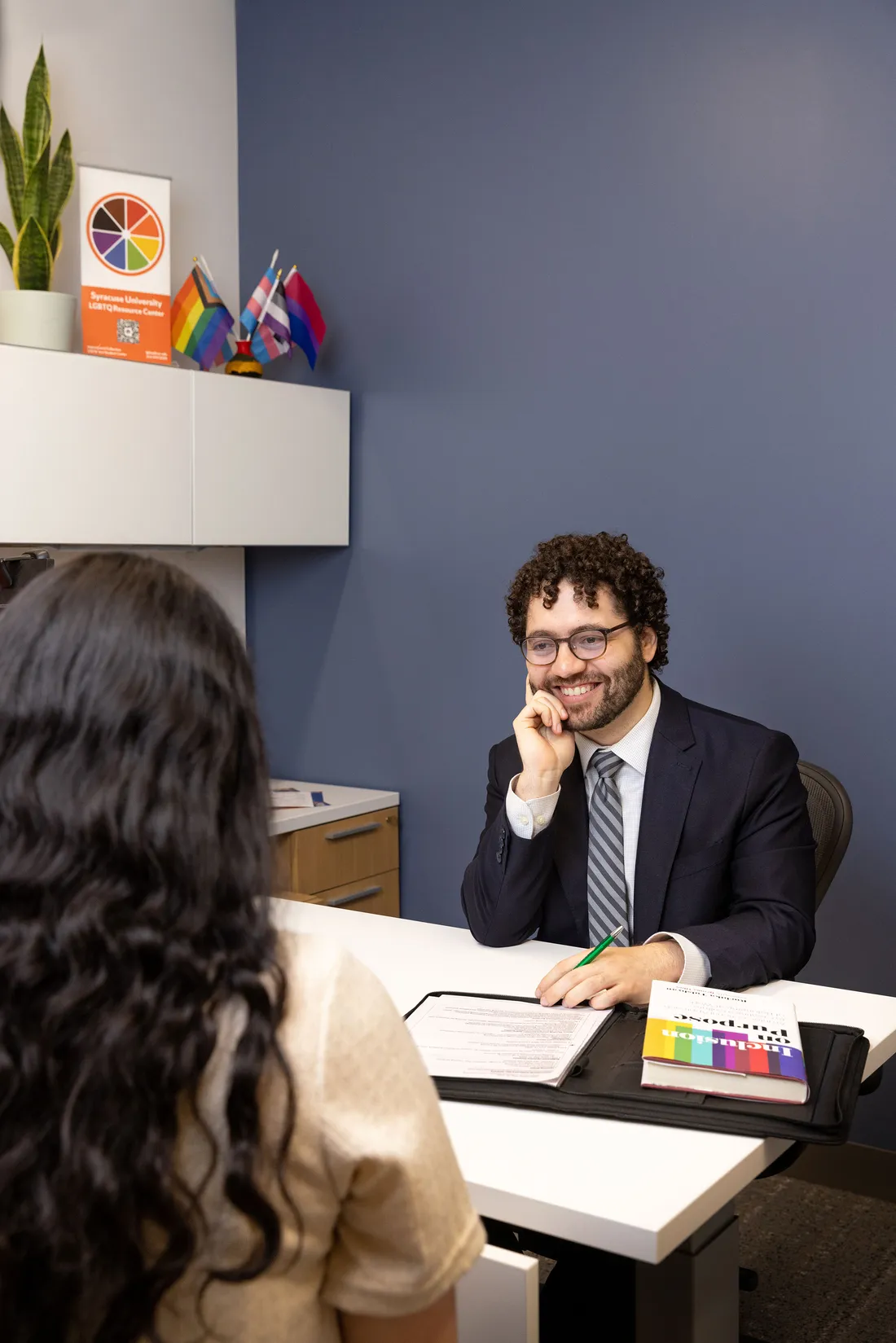
“The Intercultural Collective supports communities, not programs,” says Joshua Seguí-Rodríguez, executive director of intercultural engagement.
TDS: For many straight people, Pride Month is a rare opportunity to directly experience queer expression. This kind of awareness-raising, where we learn about the lived experiences of others, is healthy for our community and society.
NT: Through my connections in the Maxwell School of Citizenship and Public Affairs, I’ve been CNY Pride’s first intern since January. What I like about the organization [which hosted the first CNY Pride Parade and Festival in 1985] is that it doesn’t have a physical office. I can work for them anytime, anywhere.
While students, faculty and staff have participated in the Pride parade over the years, the University didn’t become officially involved until recently. [CNY Pride Board President] Jimmy Monto and I have been exploring the possibility of a statewide festival and parade, with which the University could play a leadership role. This work also informs my research into LGBTQ advocacy.
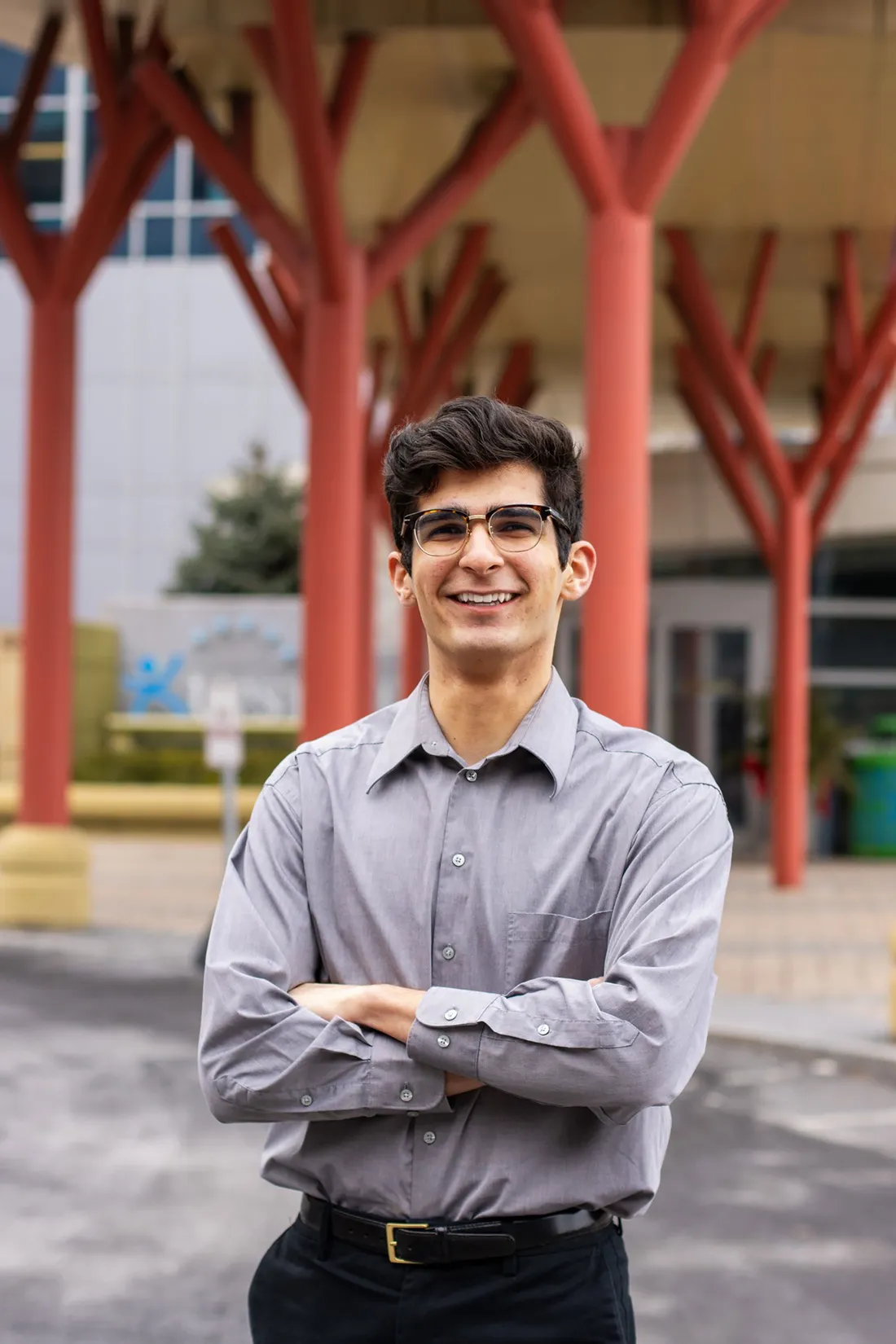
An aspiring LGBTQ civil litigator, Nathan Torabi ’26 is co-founder of the campus chapter of the Next Generation Leadership Corps.
In what ways does the IC support the notion of a welcoming campus?
JSR: Because of our location in Schine, we get a lot of foot traffic. Students also like to hang out in our lounge because it’s safe and comfortable—like being at a friend’s house.
The IC supports communities, not programs. We’re currently helping the Barnes Center at The Arch promote the University’s involvement with the CNY Pride Festival and Parade. We also work with them year round to support Trans and Gender Affirming Services. In October, the IC will partner with units like the LGBTQ Resource Center on programming for LGBTQ History Month.
There are many resources on campus and in the community for students exploring gender identity and expression. Students also can update their personal information, such as their preferred name and personal pronouns, within MySlice.
How can students become better LGBTQ allies?
NT: There are a lot of myths and misconceptions that shape public perception of the LGBTQ community. Listening and asking intelligent questions are good first steps.
As cofounder of the campus chapter of NextGen [Next Generation Leadership Corps], I recently attended a summit at Montclair State University, where I spoke about mass incarceration. That experience and my CCE courses got me thinking about how different people view LGBTQ issues. Making mistakes and exhibiting grace are part of the learning process, whether one wants to become an ally or, in my case, an LGBTQ civil litigator.
How do you build community?
NT: Mainly through my research at Syracuse. As a result, I have several people—including Junko Takeda [a professor in the history department and the interim chair of CCE], Amy Schmidt G’14 [assistant director of CCE] and Laura McArdle ’09, G’12, G’16 [director of upper-class advising in the College of Arts and Sciences and the Maxwell School]—in my corner. They’re huge supporters of my work.
Also, through my involvement with CNY Pride, NextGen and the Student Ambassadors [in Arts and Sciences and the Maxwell School], I can find out what’s on the minds of my peers. I get to put my LGBTQ advocacy skills into practice.
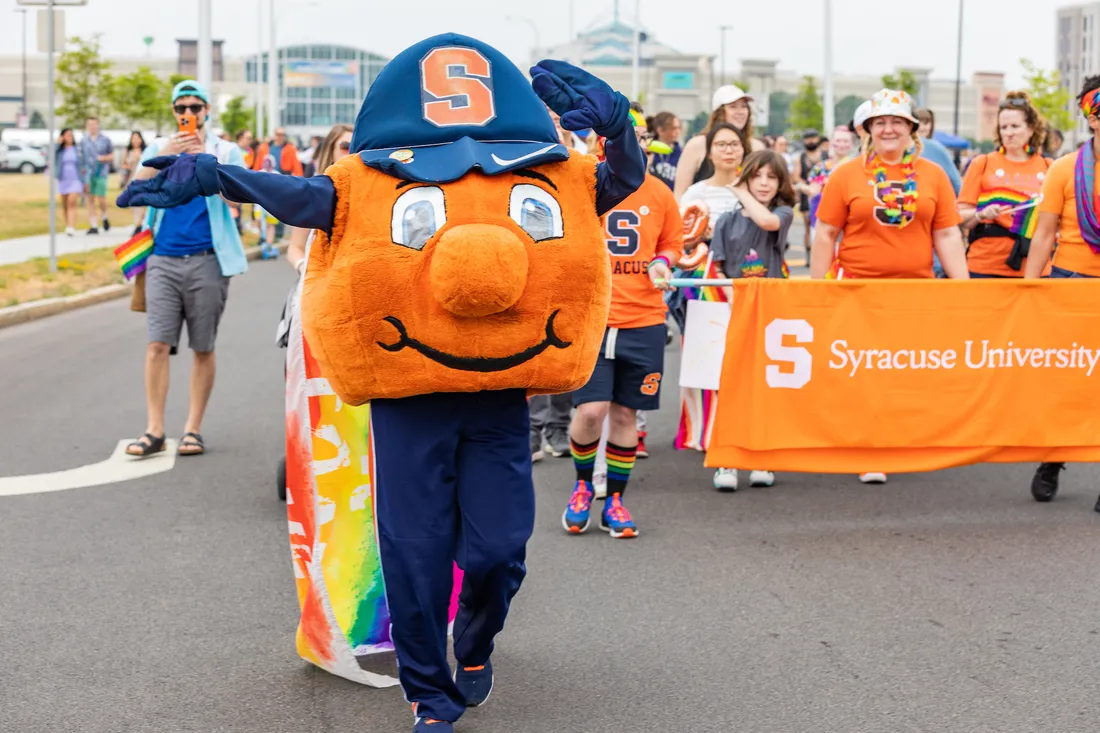
Events like Pride Month, DaSilva says, help people learn about the lived experiences of others. “This kind of awareness-raising is healthy for our community and society.”
TDS: I like Affinity Groups. They’re smaller and less formal than LLCs but also focus on diversity and inclusion. The QTPOC affinity group [for queer and trans students of color] has given me social connections and reassurance that I otherwise wouldn’t have.
I also serve on the Student Association for Public Health Education [in the David B. Falk College of Sport and Human Dynamics], the Council on Diversity and Inclusion [CDI], and the First Year Seminar’s student advisory council. I’m using them to help create a more fulfilling environment for queer people of color.
JSR: Cross-campus partnerships are excellent ways to build community. And with the arrival of people like Mary Grace A. Almandrez, vice president for diversity and inclusion [and on whose advisory council DaSilva serves], and Dawn Singleton, vice president of student transition, access and inclusion, the climate on campus is shifting in a positive way. It’s up to us to make others feel heard.

